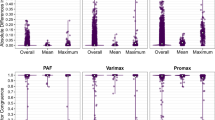Abstract
Factor scores generated via five different computational procedures were used, independently, as dependent variables in 117 univariate analyses of variance, 18 multivariate analyses of variance, 18 multiple discriminant analyses, and 14 canonical correlation analyses. Significance probabilities and their associated F ratios and chi-square. values were examined across the scoring methods to determine which of the differentially computed scores produced the smallest probability in each statistical test. Obtained frequencies (of smallest p values) were submitted to an appropriate chi-square test to contrast the effectiveness of the scoring procedures in the various statistical analyses. The results indicated no significant differences (at alpha =.05) in the observed versus expected frequencies across the five factor score algorithms in the univariate or multivariate tests. However a recurrent trend shown in the data suggests that the regressions technique may be the most effective way to compute subjects’ factor scores when they are to be subsequently used as criterion variables in statistical analyses.
Similar content being viewed by others
References
ALWIN, DUANE F. 1973. The use of factor analysis in the construction of linear composites in social research. Sociological Methods and Research, 2, 191–213.
DAGENAIS, F., & MARASCUILO, LEONARD A. 1973. The effect of factor scores, Guttman scores, and simple sum scores on the size of F-ratios in an analysis of variance design. Multivariate Behavioral Research, 8, 491–502.
FINN, JEREMY D. 1972. Multivariance: Multivariate and univariate analysis of variance, covariance, and regression, version V. Ann Arbor, Michigan: National Educational Resources.
GORSUCH, RICHARD L. 1974. Factor analysis. Philadelphia: W.B. Saunders.
HORN, JOHN L. 1965. An empirical comparison of methods for estimating factor scores. Educational and Psychological Measurement, 15, 313–322.
KIM, JAE-ON. 1975. Factor analysis. In Norman Nie, C. Hadlai Hull, Jean Jenkins, Karin Steinbrenner, & Dale Bent (Eds.), Statistical Package for the Social Sciences (2nd ed.). New York: McGraw-Hill.
McDONALD, RODERICK P., & BURR, E. J. 1967. A comparison of four methods of constructing factor scores. Psychometrika, 32, 381–401.
MOSELEY, EDWARD C, & KLETT, JAMES. 1964. An empirical comparison of factor scoring methods. Psychological Reports, 14, 179–184.
NUNNALLY, JUM C. 1967. Psychometric theory. New York: McGraw-Hill.
Author information
Authors and Affiliations
Rights and permissions
About this article
Cite this article
Laux, D.F., Tucker, R.K. The Effects of Differentially Computed Factor Scores on Statistical Decisions. Psychol Rec 29, 501–516 (1979). https://doi.org/10.1007/BF03394639
Published:
Issue Date:
DOI: https://doi.org/10.1007/BF03394639




